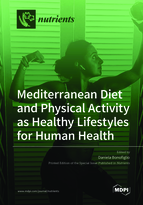Mediterranean Diet and Physical Activity as Healthy Lifestyles for Human Health
A special issue of Nutrients (ISSN 2072-6643). This special issue belongs to the section "Nutrition and Public Health".
Deadline for manuscript submissions: closed (25 October 2021) | Viewed by 31681
Special Issue Editor
Interests: natural compounds; omega-3 polyunsaturated fatty acid; PPAR gamma; breast cancer; Mediterranean diet; iodine deficiency
Special Issues, Collections and Topics in MDPI journals
Special Issue Information
Dear Colleagues,
Over the last few decades, the Mediterranean Diet (MD), characterised by high intake of vegetables, legumes, fruits, nuts, dairy products and non-refined cereals, moderate intake of fish and poultry, low intake of red meat and sweets, has been recognised as a model for healthy eating. Indeed, adhering to the MD reduces risk of metabolic and non-communicable diseases, including type 2 diabetes, metabolic syndrome, obesity cardiovascular disease and cancer. As an integral part of the traditional Mediterranean lifestyle, regular physical activity (PA) is also associated with reduced risk of chronic degenerative diseases, even if results often vary according to different types, duration and intensity or volume of PA. The World Health Organisation recommends performing moderate-intensity PA for ≥150 min/week, and vigorous-intensity PA for ≥2 days/week to have these health benefits. It is viable to hypothesise that promoting the aherence to the MD along with PA guidelines might provide a more comprehensive endorsement to obtain greater health benefits, over and above those acquired separately by the MD and PA.
Thus, the ongoing promotion and monitoring of the MD pattern, including eating habits and PA, is crucially important at all life stages. Potential topics may include, but are not limited to examining the impact of adherence to the MD and PA on health in different life stages as well as on metabolic risk factors and subsequent disease outcomes.
This Special Issue of Nutrients entitled “Mediterranean Diet and Physical Activity as Healthy Lifestyles for Human Health” welcomes original research and reviews of the literature concerning this important topic.
Prof. Dr. Daniela Bonofiglio
Guest Editor
Manuscript Submission Information
Manuscripts should be submitted online at www.mdpi.com by registering and logging in to this website. Once you are registered, click here to go to the submission form. Manuscripts can be submitted until the deadline. All submissions that pass pre-check are peer-reviewed. Accepted papers will be published continuously in the journal (as soon as accepted) and will be listed together on the special issue website. Research articles, review articles as well as short communications are invited. For planned papers, a title and short abstract (about 100 words) can be sent to the Editorial Office for announcement on this website.
Submitted manuscripts should not have been published previously, nor be under consideration for publication elsewhere (except conference proceedings papers). All manuscripts are thoroughly refereed through a single-blind peer-review process. A guide for authors and other relevant information for submission of manuscripts is available on the Instructions for Authors page. Nutrients is an international peer-reviewed open access semimonthly journal published by MDPI.
Please visit the Instructions for Authors page before submitting a manuscript. The Article Processing Charge (APC) for publication in this open access journal is 2900 CHF (Swiss Francs). Submitted papers should be well formatted and use good English. Authors may use MDPI's English editing service prior to publication or during author revisions.
Keywords
- Mediterranean Diet
- Physical Activity
- Lifestyle intervention
- Nutrition Education program
- Dietary behavior
- Nutritional recommendation
- Health benefits







